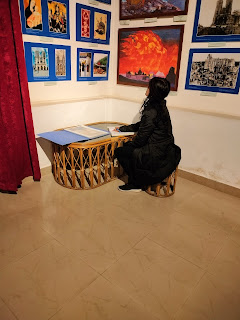On this day, ie on 6th August, 1945, the US dropped the Uranium 235 nightmare called the 'Little Boy'- over Hiroshima city and the dreadful memories still haunt the world. Well, Christopher Nolan's OPPENHEIMER based on the biography of J. Robert Oppenheimer is stealing the theaters right now with a lot of buzz across the globe.
Apart from the normal non-linear storytelling pattern, Nolan brings about certain relevant piece of thoughts through his movie. The film is shot brilliantly on i Max and there you see killing and convincing performances from Cillian Murphy and Robert Downey Jr. and others. What makes OPPENHEIMER relevant in today's world? It discusses the superimposition of politics over scientific temperament. It shows the life of a scientist who gets entrapped within the clutches of petty bureaucracy and corrupt politics. It shows how far man can go with his disastrous inventions. It proves how dangerous knowledge can be. It shows how far the Human wisdom can traverse on a negative quadrant. Whatever part the fiction could be, one cannot deny the Hiroshima and Nagasaki days from the history of modern world as it was never a fiction at all!
The movie was made based on the book called "The American Prometheus :The Triumph and Fall of J Robert Oppenheimer". The movie holds no pre conceived notions. It just shows Oppenheimer, his scientific experiments, his possible introspective mindsets, set backs, hallucinations in the backdrop of the US, Soviet, German and the Japanese politics amidst World War II. The movie is left open where Nolan makes the audience think about the realistic aspects of misused technology. It shows the repercussions of human brains that traverse on egoistic politics. Here, it takes reference from Bhagvad Gita, where Oppenheimer is found quoting : 'Now I become death, the destroyer of worlds'. As Indian mythology says, here it discusses the 'samhaara' bhava of the human mind as a whole. The vast perspective of creation and destruction is found here.
"They won't fear it until they understand it and they won't understand it until they use it":- could be an extended interception from Mahabharata. One can easily draw parallels from a Nuke Bomb to that of 'Brahmastra' in the Mahabharata. It's shouldn't be read as if the ancient people had the idea of splitting U-235. But, it should be deciphered in such a way that human imagination were always seeking the lines of diabolic schemes as that of today since inception! This is where Oppenheimer becomes relevant today. The movie is recommended for future kids! The movie becomes relevant in today's world of AI, which could become the next man made blade with an infinite potential. Nolan, depicts Oppenheimer with least CGI and maximum effort, throwing light into the issue of overused technology, and the movie takes no sides and one can think over this philosophy for the future years for sure.
Oppenheimer, shows that human beings are just victims of their own previous survival acts and they are just afraid of their own strengths to make themselves extinct!
- ©Rahul Sankalpa








